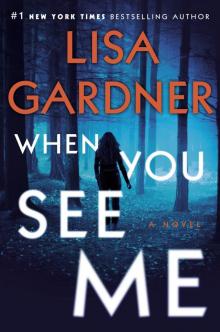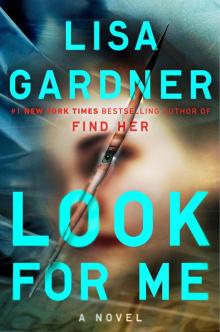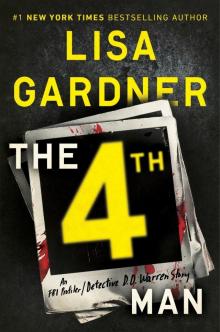- Home
- Lisa Gardner
The Perfect Husband Page 30
The Perfect Husband Read online
Page 30
Suddenly Quincy was gesturing wildly and officers scattered from their seats. Trace the call, trace the call, she watched their mouths cry silently.
Marion walked slowly to the front of the room and handed the phone to Quincy. Her face was calm, controlled. Tess’s fingers dug into J.T.’s thigh.
“Hello? Who is calling, please? Dammit, I know it’s you.”
Quincy’s gaze went to the ventilation grate high up in the wall. “No, wait, I don’t understand, tell me more. I don’t have tools—” His voice was growing frantic, urgent. His knuckles had gone white on the phone. “Give me a minute. I just need to get a screwdriver. I’m an agent, not a handyman. Wait, I didn’t hear you. Can you repeat that? There seems to be interference on the phone—
“Goddammit!” Quincy cried. Beckett had hung up, and in a rare display of rage Quincy hurled the phone across the room. It hit the far wall hard and shattered.
“Son of a bitch, son of a bitch,” Quincy was murmuring. His head was down between his knees. He was breathing hard, as if he’d run a long race. Sweat beaded his face.
He straightened slowly and looked at the faces staring back at him. Then he turned toward the ventilation grate.
“Would somebody get me a screwdriver, please.”
Nobody moved. They just stared up at the grate in the high wall. Tess felt the hysteria bubble up in her throat. No place was safe. No place could remain untouched. Jim went anywhere. He contaminated everything, like a pestilence. She felt the contamination in herself, way down deep. She understood that like Quincy, she’d traveled too far outside the bounds of the civilized world and she’d never find her way back.
“Look at me.” J.T. was before her. He’d stood, and now his hands gripped her shoulders. She managed to bring her gaze up and meet his hard, dark stare. “Come on. I want you out of the room.”
Someone had handed Quincy a Swiss Army knife with a screwdriver. He stood on a chair before the grate.
“No,” Tess told J.T.
“Dammit, don’t subject yourself to this. It’s what he wants.”
“I can’t leave.”
“Tess, dammit—”
“What if it’s . . . Sam?” Her voice was so hoarse, she barely recognized it. She hadn’t realized her true fear until she spoke the words out loud. Now the rushing filled her ears and she thought she might faint.
The grate came off. She remained sitting there, transfixed.
“Focus on me, Tess. Focus on me.”
The smell hit her first. She gagged. Spots appeared before her eyes. There were tears on her cheeks.
Dimly she heard Quincy say, “Well . . . we’ve found Lieutenant Difford’s head.”
ONE OF THE officers led them to the main room. J.T. went off to fetch them both cups of coffee. Tess remained standing in the middle of the room, letting the reassuring noise of talking people and jangling phones sink into her.
The room had high ceilings and not many windows. Once there must have been cubicles, but they’d all been taken down and replaced with long tables. Operators sat elbow to elbow at computer terminals, logging calls on the hotline and jotting down notes. The phones never stopped ringing.
Someone had posted black-and-white copies of Samantha’s picture along the wall. Her smiling, innocent face ringed the room and reminded them why they were there, why they were keeping the hours they were keeping.
Tess wanted to touch the photographs, stroke her fingers down the pale cheek, as if that would bring her daughter back to her.
It was odd to stand in the middle of such activity and yet have nothing to do with it. Once Tess had thought all this was focused on her. Now she knew better. If she ceased existing tomorrow, Jim would still kill and the law enforcement bureaucracy would still churn, trying to catch him.
J.T. returned and shoved a lukewarm cup of coffee into her hands. Quincy was on his heels with Marion.
“Why don’t we go into one of the interview rooms,” Quincy suggested. “Lieutenant Houlihan will join us shortly.”
He ushered them back to a small room with a two-way mirror. It held a single card table and two metal folding chairs. With a murmured apology he went off to find three more chairs.
“How are you holding up?” J.T. asked.
She took a sip of coffee before replying. “As well as can be expected.”
“He does it just to rattle your cage.”
“Then he’s good at rattling cages.”
He stood close. She knew he was waiting to see what she wanted. Did she need to wrap her arms around him? Maybe press her cheek against his shoulder. She thought about it, but she didn’t think there was any comfort that he could offer that would blot the picture of Difford’s severed head from her mind.
It’ll be all right, kid. I’ll take care of Sam. Houlihan and Quincy will catch Beckett. It’ll be all right, kid.
Quincy returned with the chairs and they all took seats. Moments later Lieutenant Houlihan joined them. His face was still gray and his forehead lined with frustration, anger, and pain.
“No blood,” he said without preamble. “The head was cut off immediately after death, frozen to slow decomposition, then left in the ventilation shaft. You can access the shaft via the roof. Son of a bitch must’ve crawled in the morning we were all still at the crime scene and left his little present.” Belatedly he glanced at Tess and Marion. “Sorry,” he muttered.
“It’s okay,” Tess said as she gripped her cup more tightly. “I’m getting used to these conversations.”
“How did he get Special Agent Quincy’s cell phone number?” Marion was eager to establish that she was part of the law enforcement group and not some weak-kneed female observer. “Surely your number is unlisted, sir.”
“Difford had it,” Quincy said. “Wilcox too. Beckett either found it on their persons or asked them for it.”
That made everyone in the room visualize just how he would “request” information, and they all shifted uncomfortably in their chairs. Tess found herself looking at J.T. again. His gaze was locked on the far wall, but she could see that his jaw was tight. He wouldn’t worry about himself, it wasn’t his nature. But she imagined he could vividly picture Jim Beckett attacking either her or Marion. She had made that horror part of his world. It seemed so blatantly unfair.
“Why just the head?” she asked after a moment.
“I don’t know,” Quincy replied.
“Scare tactics,” J.T. stated. “Demoralize the troops.”
Quincy frowned but didn’t argue. It was obvious the straightlaced agent didn’t approve of a mercenary.
“He still has Difford’s body,” Marion pointed out.
“Perhaps,” Quincy shrugged. “No one’s checked the trunks of their cars.”
They all fell silent, and the air was heavy and strained.
“Do you think you should also be under watch?” Tess spoke up softly. “You keep saying I’m the target, but he’s focused on most of the people who helped catch him before. That was me, Difford, and you, Quincy.”
“It bears consideration.”
“What if he uses the safe house as a ruse? The police are watching me in it, so he seizes the opportunity to get you. That would be something he’d do.”
“Absolutely.” Quincy thrummed the table with his fingers. “I’ll be in the surveillance van with Lieutenant Houlihan for most of the watch. They can guard my back.”
“Snipers?” J.T. quizzed. “Three’s nothing for a town.”
“Williamstown is small,” Lieutenant Houlihan interjected. “You can walk from one end of it to the other in just twenty minutes. Basically it’s a collection of old buildings that make up Williams College, with some historic storefronts for the tourists. Tess’s house is on Elm Street, ten minutes from Main Street. The whole block is old, restored row houses. We’ll position the snipers on the corners, providing aerial coverage of the street.”
“One corner will be uncovered.”
“True, but visibility i
s pretty good. We’ll put one guy mid-block on the right with the other two on the left-hand corners, forming a triangle around Tess’s house. It should keep the roof clean.”
“And the officers on duty?” J.T. persisted skeptically. It was obvious he didn’t think much of the police or their efforts.
“We’ll have a main surveillance van, two unmarked cars, and three pairs of cops walking the city. It’s a college campus with a lot of young coeds. We’ll warn everyone of the danger and maintain a strong police presence throughout the campus. Williams College security and the local police will also provide regular patrols.”
“Uh-huh. Won’t a surveillance van parked outside the house be a bit obvious?”
“It won’t be on Elm. Arnold, Hall, Maple, and Linden all intersect. We’ll pick one of the streets as a starting point and move around between them.”
“Why are you so sure he’ll come?” Marion pressed no one in particular. “It’s the way you caught him the first time, so he knows it’s risky. Two, it doesn’t fit his pattern. JIM BECKETT WAS HERE or JIM WAS NUMBER ONE makes sense. JIM BECKETT WAS W? I don’t see how it can fit.”
“He’ll come,” Tess said.
“Because he’s deteriorating?”
“Because he always finishes what he starts,” Tess murmured. “Always.”
Marion sat back. “I guess I just don’t understand that kind of anger.”
“You can’t,” Quincy spoke up. “You’re a woman.”
When Marion tried to protest, Quincy waved her down tiredly. “I’m talking statistics, not chauvinism. Most serial killers are male. Maybe part of it’s hormones, but certainly it’s also behavioral. When men get angry, they are taught to lash out at others. When women get angry, they are taught to turn in on themselves. Quite simply, your mothers torment you and you become alcoholics or anorexics or suicide risks. You don’t become killers.”
His gaze slid to Tess. He spoke matter-of-factly.
“Beckett will come, Ms. Williams. And when he does, it will be bloody.”
MARION WAITED FOR her brother and Tess to return to their motel before she made her move. It was after six, but the war room showed no sign of slowing down. Phones were ringing, operators answering. Lieutenant Houlihan was yelling at some young officer while simultaneously crunching Tums. The mood in the building was stark.
She kept walking, looking for a vacant interview room or forgotten corner. Instead, she ran into Officer Louis, a straw-haired kid who looked too much like Richie Cunningham for his own good. He spotted her coming, froze, and gulped noticeably.
She’d run into him earlier that day. Perhaps someday he’d be a good police officer, but personally she thought he had the spine of a jellyfish. In turn, he seemed to view her as the human equivalent of a black widow spider, waiting to seduce him into answering her questions, at which time she would calmly bite off his head to complete the mating.
“I’m looking for Special Agent Quincy.”
Officer Louis couldn’t get the words out. He backed against the wall and pointed down the hallway. Shaking her head, Marion walked past him. His sigh of relief was audible.
She found Quincy sequestered in his own little space, surrounded by crime scene photos. He didn’t look up right away. She used the opportunity to glance at the color photographs. They didn’t appear to be from Jim Beckett’s files. Most of these victims were middle-aged women. They’d been carved up brutally by a serrated knife.
Quincy sifted through them one by one, as though he were shuffling a deck of cards. At long last he sighed, shook his head, and finally set them down, clearly not having found what he was seeking.
“Another case, sir?” she asked respectfully. She’d automatically assumed a cadet’s stance, legs apart, shoulders square, hands behind her back.
“Santa Cruz,” he muttered, his gaze still on the photos. “Can you believe that at one time Santa Cruz was the serial killer capital of the world with three active murderers? Now we have another there. It makes you wonder what’s in the water.”
He pushed back from the rickety table. Marion could see the exhaustion deeply stamped into his face. His hand was rubbing the back of his neck.
“And her?” Marion asked, suddenly feeling too unnerved to state her real purpose for finding him. She gestured to the framed portrait of a smiling brunette.
“Oh, her? My wife. I mean ex-wife.” He smiled ruefully. “Divorce came through a few weeks ago. I guess I’m still adjusting. I’ve always traveled with her picture, you know. Set it up in every cheap motel and overheated police station in the country. Now I find I can’t work without it. Silly, isn’t it?”
Marion shifted, even more discomfited by this personal insight. “Not really, sir. My . . . uh, my husband and I recently split as well. After ten years. It’s a big adjustment.”
“Hard to be married and be an agent.”
“That’s what everyone says.”
He smiled. “It is a platitude, isn’t it?”
“I don’t know, sir.”
They drifted into silence, but it was too unsettling for both of them. “What can I help you with, Agent?” Quincy asked briskly.
“I . . . I want to speak with you about my role in this case.”
“Your role? You’re not even officially on this case, Agent. So far your involvement is due to circumstance, not assignment.”
“I understand. I would like to change that if it’s possible. I’ve been interested in this kind of work for a long time.”
“I pulled your file.”
Marion waited patiently.
“You have a good record. Seems that you can be rigid at times, but you keep a cool head and have above-average analytics.”
“Thank you, sir.”
“But from what I could tell, your experience is in white-collar crimes, mostly bank frauds—”
“There have been some homicides,” she interjected. “Deals gone bad, informants who were found out, that kind of thing.”
“But always in conjunction with a fraud case.”
“Dead is dead, sir. They were connected with our work, crime scene came under our jurisdiction, and we got to figure out who killed them.”
“The Investigative Support Unit is different, Agent. It’s all we do. A typical cop may see a gruesome murder two or three times a year. They might see a serial killer once in their career.” Quincy gestured to the pictures spread out on the table. “This is all I see. One hundred and fifty cases of killing, rape, child molestation, and kidnapping. I deal only with the extremes, day in, day out. On the road, in the office, this is it.”
“I understand.”
“I would be lying if I said it didn’t get to you.”
Her chin came up. “I think I can handle it, sir.”
“I don’t think you know what ‘it’ is.”
“Is it because I’m a woman?”
“Don’t insult me, Agent.” His voice held clear warning. She persisted anyway.
“You talk statistics, sir. Well, the Bureau statistics show that female agents are disproportionately assigned to white-collar cases and not homicides.”
“That’s the Bureau. We have female profilers in the Investigative Support Unit—and they’re damn good. And you’re not them, Agent. They paid their dues. They served as cops, forensics pathologists, or criminologists. They all joined with extensive homicide experience. If you’re serious about the ISU, talk to your director about getting on some different cases. Prove yourself in the kiddie pool before you jump into the ocean.”
“I have this opportunity now.” Her voice was steady but her eyes burned. She was being put in her place and she hated it. Sometimes it seemed her whole life had been spent being put in her place by men who should’ve known better. Who should’ve trusted her more.
“I have some ideas,” she persisted.
“Agent—”
“Just hear me out. I looked at Jim Beckett’s file. I’ve spoken to Tess Williams at length. I think it’s clear,
I think it’s obvious, Jim Beckett must have an accomplice. You said he can’t go long without female companionship. Tess also stated that he charms and seduces women as a hobby. I think there is someone helping him with everything, someone who helped him two and a half years ago, when he disappeared for the first time. And I think I may know how to find that person.”
Quincy appeared skeptical but he didn’t interrupt.
She kept talking before she lost her courage. “Let’s assume for a moment that the woman isn’t a random stranger but someone he’s known for a while. That means he would need to maintain the relationship even while in prison.”
“Shelly Zane was his only visitor ever logged.”
“Yes, but what about called? I checked with Walpole. Beckett was a model prisoner. He didn’t have any disciplinary tickets written up, and as a ‘ticket free’ maximum security inmate, he was entitled to four phone calls a month, up to thirty minutes apiece.”
“I know, Agent. And as you must have found out from Walpole, those calls are monitored. Prisoners must file all numbers with security to be approved. They don’t even get to dial. The guard brings the phone down to the cell, plugs it in, places the phone call, and then passes the phone through the window for the inmate to pick up. A four-digit security code has to be entered for any number to go through, so the prisoner can’t try to covertly hang up and dial a different number. Any sign of two-way calling, and the phone automatically disconnects. The system is pretty rigid, and we checked Beckett’s numbers. He called Shelly Zane about twice a month and his lawyer for the other calls.”
“I know, sir,” Marion forced herself to say patiently. “I did look into the matter. I know two-way calling shuts off the phone, but what about call forwarding?”
“Who would forward a call for a prisoner?”
“Shelly Zane.”
Quincy was silent for a moment. Then he blinked his eyes. “I don’t know if Zane has call forwarding.”
“She does. I checked. She used it a lot. In the last two years calls were forwarded to two hundred and forty-seven different numbers. I compiled a list.”
Slowly Quincy nodded. “We should look into that. We can ask Houlihan to have Task Force A start in on it immediately. They could use a few good leads.”

 Find Her
Find Her Before She Disappeared
Before She Disappeared One Step Too Far
One Step Too Far When You See Me
When You See Me Never Tell
Never Tell Touch & Go
Touch & Go The Survivors Club
The Survivors Club MacNamara's Woman
MacNamara's Woman Love You More: A Novel
Love You More: A Novel Gone
Gone The Perfect Husband
The Perfect Husband Maggie's Man: A Family Secrets
Maggie's Man: A Family Secrets The 7th Month
The 7th Month The Neighbor
The Neighbor Hide
Hide 3 Truths and a Lie
3 Truths and a Lie Catch Me
Catch Me Fear Nothing: A Detective
Fear Nothing: A Detective Right Behind You
Right Behind You The Guy Who Died Twice
The Guy Who Died Twice Live to Tell: A Detective D.D. Warren Novel
Live to Tell: A Detective D.D. Warren Novel Live to Tell
Live to Tell Maggie's Man: A Family Secrets Novel
Maggie's Man: A Family Secrets Novel The Other Daughter
The Other Daughter Alone
Alone Crash & Burn
Crash & Burn The Detective D. D. Warren Series 5-Book Bundle
The Detective D. D. Warren Series 5-Book Bundle Look for Me
Look for Me Love You More
Love You More The FBI Profiler Series 6-Book Bundle
The FBI Profiler Series 6-Book Bundle The Third Victim (Quincy / Rainie)
The Third Victim (Quincy / Rainie) Say Goodbye
Say Goodbye The 4th Man
The 4th Man 3 Truths and a Lie: A Detective D. D. Warren Story (Kindle Single)
3 Truths and a Lie: A Detective D. D. Warren Story (Kindle Single) Brandon's Bride
Brandon's Bride